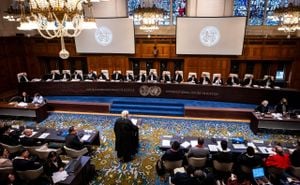Thailand's economic outlook for 2025 reveals both challenges and opportunities, driven by global geopolitical changes and shifting market dynamics. Chief Investment Office (CIO) of DBS Bank has analyzed these factors and presented strategic insights for investors.
According to Mr. Wey Fook Hou, the Chief Investment Officer at DBS Bank, the political climate, particularly the anticipated second term of former U.S. President Donald Trump, increasingly complicates the global economic environment. With the Trump administration poised for significant policy shifts around tax, immigration, and climate, he acknowledges the potential for these changes to disrupt market stability and heighten investment risks worldwide.
Mr. Hou emphasizes the importance of adjusting investment portfolios through what is termed the "Barbell Strategy." This approach divides investments between high-risk sectors driven by aggressive economic stimulus policies and safer defensive assets to mitigate risk amid growing uncertainties. Through this method, investors are encouraged to capitalize on opportunities within the U.S. equity markets, which are expected to benefit from economic recovery, all the more so as the potential for recession recedes.
DBS’s analysis suggests enhancing the weight of U.S. stocks within portfolios, reflecting the anticipated growth from corporate tax cuts and increased government spending. Conversely, European equities have been advised to maintain an underweight status due to expected lower returns amid the increasing tensions over trade tariffs and competitive pressure from Chinese exports.
The report also highlights fixed-income investments as noteworthy due to appealing yields—particularly U.S. Treasury bonds, which have recently offered returns around 4.4 percent annually. This strategic positioning aims to cushion portfolios against adverse impacts linked to geopolitical tensions and trade wars.
“The geopolitical environment remains complex and sensitive, particularly with Trump’s administration solidifying control over both houses of Congress. This control enables the facilitation of legislative agendas which could inherently reshape different economic landscapes,” stated Mr. Hou.
Speculation arises around the U.S. economy's resilience, largely attributed to strong labor markets, low-interest rates, and high household wealth levels. The report estimates household debt at historic lows and outlines the corresponding benefits for domestic consumption. These patterns contribute positively to investor confidence.
A key area of focus for Thai investors is the ASEAN markets outside Japan. Given current valuations, the ASEAN stock market remains approximately 34 percent cheaper than developed markets, presenting unique prospects for capitalizing on the region’s anticipated growth due to supply chain diversification strategies influenced by the "China+1" policy.
Investors are urged to remain vigilant about potential risks associated with changes to fiscal policy and the upward pressure these might create within the inflationary curve. The analysis encourages observing trends around monetary policy, particularly from the Federal Reserve and the European Central Bank (ECB), as they may greatly influence funding costs and, by extension, investment sentiments.
On the commodities front, gold remains recommended as an asset due to prevailing tensions and the continual increase of the U.S. fiscal deficit, adding layers of complexity to the investment decision-making process.
To navigate the forthcoming fluctuations within the market, utilizing hybrid investment strategies incorporating both traditional and alternative assets is advocated to manage liquidity efficiently. This position allows investors to face economic obstacles and political policies proactively.
A recent meeting led by the Office of the Civil Service Commission (OCSC) highlights Thailand's alignment with global regulations concerning the importation of commodities linked to deforestation, such as palm oil and rubber. This move is likely to shape Thailand’s agricultural product markets significantly. Key representatives from relevant sectors discussed forward progress toward compliance with the European Union Deforestation Regulation (EUDR), set to take effect by December 2025.
The EUDR mandates strict standards for traceability concerning agricultural imports, necessitating support for the establishment of geolocation mapping systems within Thailand. The plan seeks to improve monitoring frameworks for agricultural producers, ensuring adherence to international environmental regulations.
Industry representatives also called for immediate assistance from government agencies to implement comprehensive traceability and compliance verification systems to protect exporters from potential market disruption. The EUDR is part of global efforts to combat deforestation caused by agricultural expansion.
The meeting portrayed strong collaboration between public and private sectors, exhibiting proactive approaches toward tackling challenges head-on to bolster the economic outlook of Thailand as it heads toward more stringent global trade norms.
Overall, the investment climate within Thailand appears to remain adaptive, with strategist recommendations pointing to multifaceted strategies adaptable to changing parameters influenced by both domestic growth and international trade dynamics.



